Same spice, new name! Our Kebab Blend is the exact same recipe as Köfte Baharat—just a fresh name for all your grilling adventures.
Deeply savory and bursting with flavor, Kebab is a traditional Turkish spice blend for meat. A classic, savory blend of chilis, garlic, cumin and allspice, it has a warm flavor and enticing aroma and is perfect for Turkish and Eastern Mediterranean dishes. Versatile and balanced, it's at home in sausage, burgers, veggies, beans and soups.
In Turkey, this blend is typically for seasoning lamb or beef meatballs, kebabs and burgers, and the famous dish çig köfte. We've got a recipe for the vegan version of the dish below.
Try it stirred into yogurt for a quick and easy sauce, sprinkled over eggs for a savory breakfast, mixed with veggies before roasting and used as a rub for grilled salmon or any other hearty fish.
Meet your new go-to blend for traditional Turkish and Eastern Mediterranean dishes and for all of your summer grilling. Or do it like we do: keep a jar on the table and sprinkle over everything.
Kebab is also available in our Origin Blends Collection. Click here to learn about all of our origin blends.
8-spice set:
-
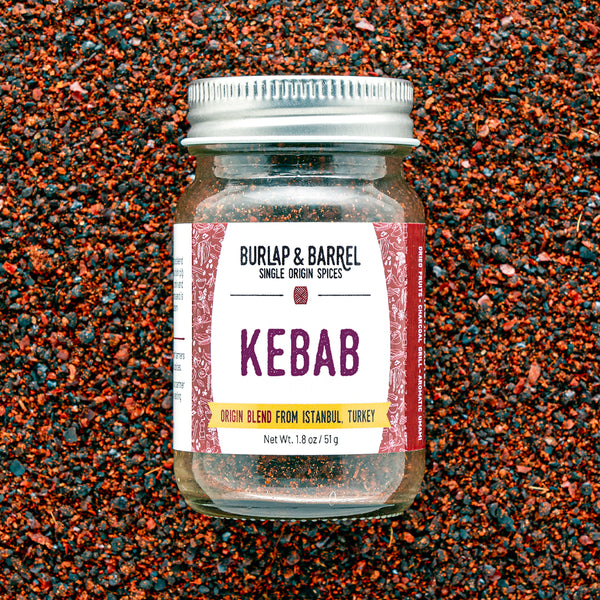 Deeply savory and bursting with flavor, Kebab t is a traditional Turkish spice blend for meat. A classic, savory blend of chilis, garlic, cumin and allspice, it has a warm flavor and enticing aroma and is perfect for Turkish and Eastern Mediterranean dishes. Versatile and balanced, it's at home in sausage, burgers, veggies, beans and soups.
Deeply savory and bursting with flavor, Kebab t is a traditional Turkish spice blend for meat. A classic, savory blend of chilis, garlic, cumin and allspice, it has a warm flavor and enticing aroma and is perfect for Turkish and Eastern Mediterranean dishes. Versatile and balanced, it's at home in sausage, burgers, veggies, beans and soups.Black Urfa chili, silk chili, cumin, allspice, garlic, sea salt, sunflower seed oil
- Rub on meats or vegetables before grilling or roasting
- Add to meatball or bulgur mix before cooking
-
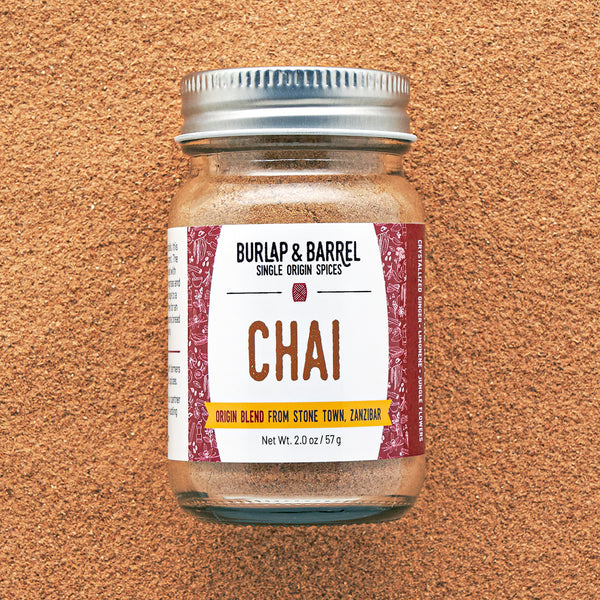 Beloved in Zanzibar's kitchens and street stalls, our Chai is warm, comforting and ethereally fragrant. The archipelago's prized pink cloves are blended with locally sourced cinnamon, cardamom, lemongrass and orange peel to create an East African homage to a beloved Indian masala.
Beloved in Zanzibar's kitchens and street stalls, our Chai is warm, comforting and ethereally fragrant. The archipelago's prized pink cloves are blended with locally sourced cinnamon, cardamom, lemongrass and orange peel to create an East African homage to a beloved Indian masala.Cardamom, ginger, cloves, cinnamon, black pepper, thyme, lemongrass, orange peel
- Zanzibar Chai (recipe from our partners in Zanzibar)
- Chai-Chili Brownies
- Add to cookies, pastries and pie dough
- Sub for spice blends in pumpkin or apple pies
-
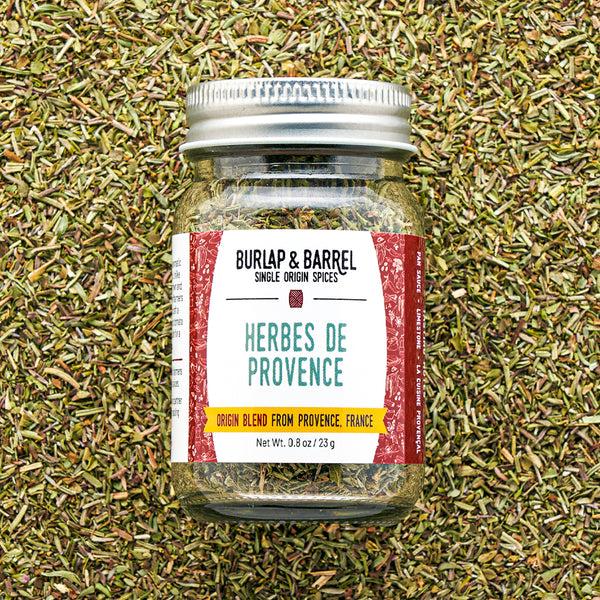 Herbes de Provence is an iconic blend of hardy, aromatic herbs and a cornerstone of French cooking. Unlike every other product in the US, ours is truly grown and blended in Provence itself, by a cooperative of farmers who cultivate organic heirloom herbs and craft a perfectly balanced, traditional mélange. Add to tomato sauces, roasts, pan sauces and any other dish for a boost of savory, fragrant aromatics.
Herbes de Provence is an iconic blend of hardy, aromatic herbs and a cornerstone of French cooking. Unlike every other product in the US, ours is truly grown and blended in Provence itself, by a cooperative of farmers who cultivate organic heirloom herbs and craft a perfectly balanced, traditional mélange. Add to tomato sauces, roasts, pan sauces and any other dish for a boost of savory, fragrant aromatics.Rosemary, savory, oregano, thyme
- Rub on proteins (especially chicken) before braising or baking
- Sprinkle over fresh tomatoes with good olive oil and bake, then eat with crusty bread
- Coat potatoes in a mixture of olive oil and salt, then add herbs and bake or pan-fry
-
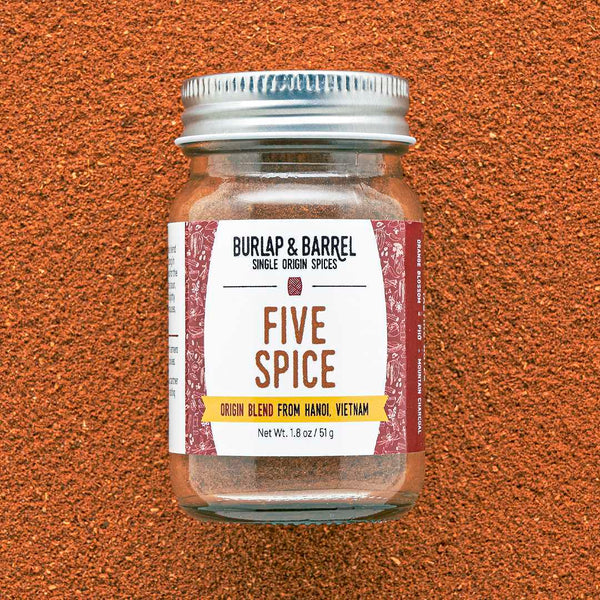 Our Five Spice is an ancient, aromatic, versatile blend beloved across East Asia. Called Ngũ Vị Hương in Vietnamese and 五香粉 in Chinese, it's named for the five traditional Chinese flavors (sweet, bitter, tart, salty and savory). It brings a warm, savory, slightly spicy burst of flavor to grilling rubs, stews, sauces, stir-fries, braises and red cooking.
Our Five Spice is an ancient, aromatic, versatile blend beloved across East Asia. Called Ngũ Vị Hương in Vietnamese and 五香粉 in Chinese, it's named for the five traditional Chinese flavors (sweet, bitter, tart, salty and savory). It brings a warm, savory, slightly spicy burst of flavor to grilling rubs, stews, sauces, stir-fries, braises and red cooking.Star anise, cinnamon, cloves, black pepper, coriander
- Combine with soy sauce as a glaze for cooking protein or hearty vegetables
- Use as a sub for cinnamon in desserts
- Add to braises, beans and other long-cooked dishes
-
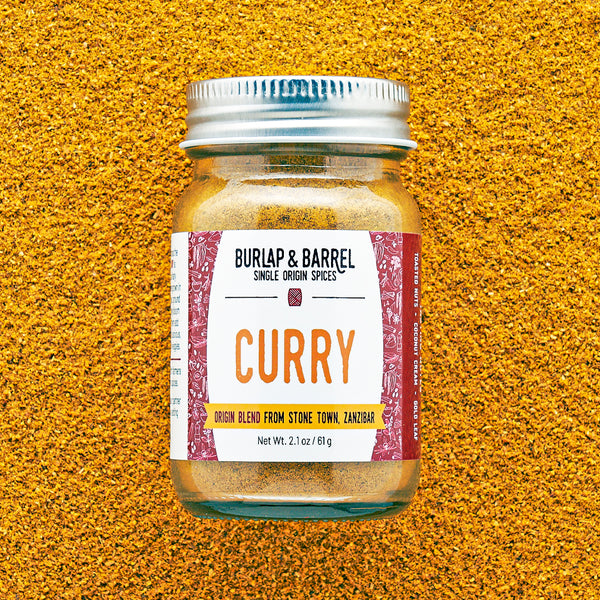 An aromatic homage to the trade winds across the Indian Ocean, our golden Swahili Coast Curry is descended from thousands of years of culinary exchange. The spices in this Origin Blend were grown in an organic agroforestry system and then dried, ground and blended by our partner cooperative.
An aromatic homage to the trade winds across the Indian Ocean, our golden Swahili Coast Curry is descended from thousands of years of culinary exchange. The spices in this Origin Blend were grown in an organic agroforestry system and then dried, ground and blended by our partner cooperative.Cumin, coriander, garlic, turmeric, black pepper, fenugreek, fennel, ginger, cardamom
- Use as a rub for meat and vegetables for roasting
- Simmer in coconut milk for stews
- Bloom in oil or ghee to start cooking a fragrant dish
-
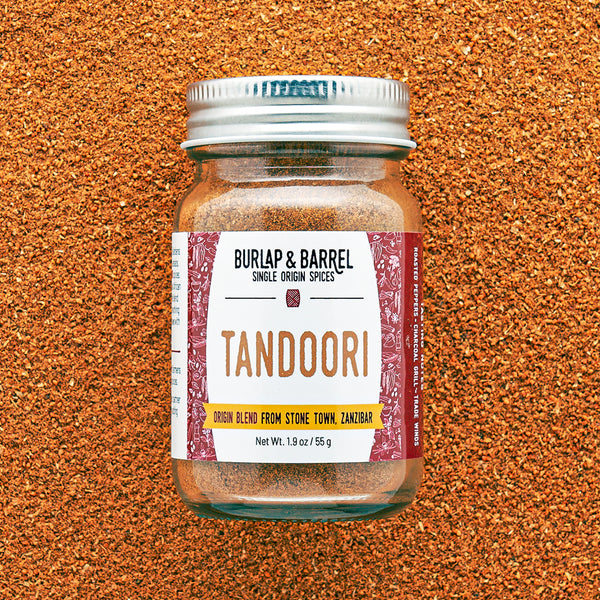 The night market in Stone Town's Forodhani Gardens is famous for grilled seafood and tiny meat kebabs, heavily seasoned with savory, complex Tandoori spices. A rich combination of Indian, Arabian and East African roasting and grilling traditions.
The night market in Stone Town's Forodhani Gardens is famous for grilled seafood and tiny meat kebabs, heavily seasoned with savory, complex Tandoori spices. A rich combination of Indian, Arabian and East African roasting and grilling traditions.Garlic, paprika, coriander, cumin, ginger, cloves, fenugreek, cardamom, mustard
- Rub on meat or vegetables before roasting or grilling
- Add to marinades for a rich, savory burst of flavor
- Make a soup or stew with tomatoes and serve with yogurt
-
 Inspired by the traditional Palestinian za'atar blend, we mixed Palestinian za'atar oregano with our famous black lime from Guatemala, as well as benne seeds, a sesame relative with African roots that's grown in the American south. Stir into olive oil for a classic bread dip, or rub over meats and vegetables before roasting.
Inspired by the traditional Palestinian za'atar blend, we mixed Palestinian za'atar oregano with our famous black lime from Guatemala, as well as benne seeds, a sesame relative with African roots that's grown in the American south. Stir into olive oil for a classic bread dip, or rub over meats and vegetables before roasting.Toasted benne seeds, sumac, za'atar oregano (Origanum syriacum), kosher salt, black lime
- Mix with olive oil as a dip for bread or rub for vegetables or protein
- Use as a rub for baked chicken or eggs
- Roast vegetables and potatoes, then top with tahini and za'atar
-
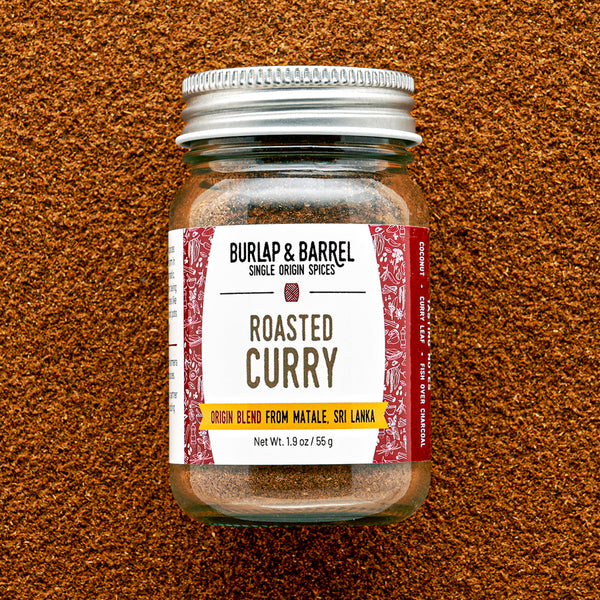 Classic dark-roasted Sri Lankan curry powder, made from spices grown all on one farm.
Classic dark-roasted Sri Lankan curry powder, made from spices grown all on one farm.Black pepper, coriander, cumin, fennel, garlic, chili, cardamom, cinnamon, ginger, curry leaves, ramps, lemongrass
- Bloom in oil to start curries and stews
- Add to roasting or braising meats and vegetables
- Season dark beans
Highlights
Ingredients
Black Urfa chili, silk chili, cumin, allspice, garlic, sea salt, sunflower seed oil
Cooking tips
- Rub on meats or vegetables before grilling or roasting
- Add to meatball or bulgur mix before cooking
SOURCING

Our Köfte Baharat blend was made by our partner Ahmet and his family's 4th-generation spice business in the Istanbul spice bazaar.
This blend has a long, meandering culinary history, and many variations exist that use different ratios of spices. You can read the blend's 4,000-year-old origin legend here.
Traditionally, the Turkish dish çiğ köfte (meaning "raw meatball") was made with ground raw meat mixed with this spice blend and hand-formed into a hand-shaped meatball, with the finger marks forming the iconic shape.
Nowadays, most çiğ köfte is typically made vegan, with bulgur wheat standing in for the meat. Some vendors and restaurants still make it in the traditional way, with raw meat, but the meat is cured with vinegar.
The other essential ingredients in this delicious dish include onion and pomegranate molasses. Our spice supplier told us that pomegranate molasses in combination with this spice blend is considered by Turkish people to be "an inseparable whole with a unique harmony." When you taste it, you'll know exactly what he's talking about.
Ali, another one of our longtime partners in Turkey, shared this Turkish legend about the origins of çiğ köfte:
Nemrud, the king of an ancient civilization in the city of Adıyaman, decides to burn Abraham (the prophet) because he believes in only one god. With the order he gave to his people, all the wood and wood pieces in the kingdom gathered in a big square. There was no piece of wood left for cooking in the houses and it was forbidden to make fires. The people gathered pieces of wood in the square for days by the order of the king.
A hunter who was unaware of this order because he was hunting on the mountain, brought the deer he had hunted to his house and asked his wife to cook it. His wife tells about the king's prohibition to light a fire. The hunter also obeys the desperate order. The hunter separates the right hind leg of the deer and crushes it with a stone.
By adding bulgur, pepper and salt, he kneads them thoroughly with the crushed meat. It is rumored that raw meatballs were first made by this hunter and his family. Raw meatballs, which emerged about 4,000 years ago when Abraham was thrown into the fire, has survived as a food type from that day to today.




























